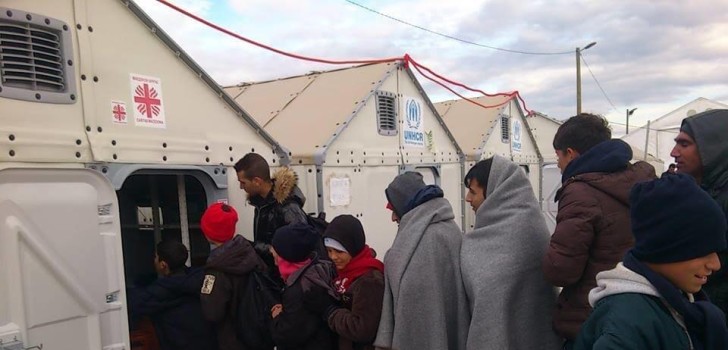Macedonia remains a major transit destination where thousands of refugees from Syria, Afghanistan and Iraq are trying every day to reach their final destination in Western Europe. Although they remain only a short period of time in the country, low temperatures hamper their movement. Macedonian authorities and humanitarian organizations expect to successfully cope with refugees during the winter months, but they say they want greater assistance for that.
The country and international organizations are working intensively to upgrade power grids in order to improve conditions in the refugee camp at the Macedonian-Greek border. They’re also working on insulation and large tents to avoid losing heat, according to Jasmin Rexhepi from NGO Legis of Skopje.
“Legis shared 500 hot soups with bread in Gevgelija and 800 at the border crossing point of the Macedonian border with Serbia, and a thousand food packets in each center and teas. The clothes is divided into winter clothes that is donated by citizens as well as hats, scarfs, gloves and boots. We consider this individual approach is more effective for inside and outside refugee centers,” said Rexhepi.
Rexhepi warned of deficiencies in transporting refugees to the border crossing with Serbia.
“What is important is to have enough food and warm clothes, and timely transportation from Gevgelija to Tabanovce. But is happening to stay small groups of 50 to 150 refugees for hours awaiting the next train. It is inhumane. It should now be directed to bus and taxi service to not freeze in the camp. Sooner or later all of them are arriving successfully. It takes more translators and additional winter equipment for volunteers,” said Rexhepi.
“Day by day the transit center for refugees expands and adapts their short stay in Macedonia to be humane. At the moment large tents accommodating refugees are heated with gas, mothers with small children and the disabled have a particular space where they can rest and meet their needs,” said Lence Zdravkin, a civilian volunteer who has been working with refugees for the last three years.
Zdravkin said that in addition to regular meals, these people also receive regular medical care.
Suzana Miceva, a national journalist, recounts on the various people she’s met at the camps.
“I met eye surgeon from the city of Aleppo. He began the journey with friends, he wanted to reach Germany to find a safe place, work, better life. He showed her phone hometown before the bombing, then. Tired and dirty all over, talked about his professional successes and dreams for the future. I know I came to Munich after a long torture in Hungary. We exchange contacts and we are communicating via Facebook, and he is a member in the group to help migrants,” said Miceva.
Mayor of the border city of Gevgelija, Ilija Frangov has required that an alternative border be opened at the crossing with Greece to facilitate the flow of refugees.
“There was an initiative and it was sent from the Ministry of Foreign Affairs of Macedonia to Greece, but unfortunately it pass four years with no answer. It is good when more controlled and would regularly entering migrants in our country. The crossing is where now are entering migrants in addition to the railway line. We will spend an additional need for security and electricity in winter period. We have need for additional machinery, construction mechanism,” said Frangov.
So far, more than 600,000 refugees have passed through Macedonia. This is a huge figure, implying that the Balkan route between Greece-Macedonia-Serbia-Croatia is a more acceptable option for migrants than the Mediterranean route.
Four countries from the Visegrad group are pledging to send aid. Czech Republic announced it was sending 25 police officers in the country and will donate an additional 770,000 euros. Police officers in Macedonia will stay from January to February next year.
“The Czech Republic will continue to assist to overcome the refugee waves in Europe. In Hungary and Slovenia will send officers in Macedonia, where they assist in maintaining order,” said Czech Prime minister Bohuslav Sobotka.
The European Agency for the Management of Operational Cooperation at the External Borders of the EU (FRONTEKS) will also be sending aid to help manage the influx of refugees.
Stay Connected
